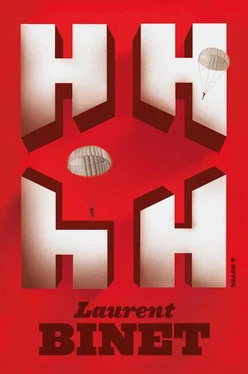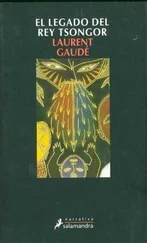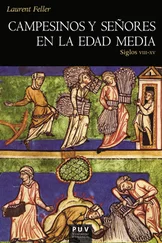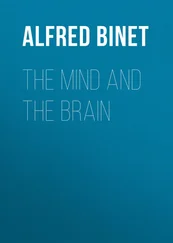Laurent Binet - HHhH
Здесь есть возможность читать онлайн «Laurent Binet - HHhH» весь текст электронной книги совершенно бесплатно (целиком полную версию без сокращений). В некоторых случаях можно слушать аудио, скачать через торрент в формате fb2 и присутствует краткое содержание. Город: New York, Год выпуска: 2012, ISBN: 2012, Издательство: Farrar, Straus and Giroux, Жанр: Историческая проза, на английском языке. Описание произведения, (предисловие) а так же отзывы посетителей доступны на портале библиотеки ЛибКат.
- Название:HHhH
- Автор:
- Издательство:Farrar, Straus and Giroux
- Жанр:
- Год:2012
- Город:New York
- ISBN:978-0-374-16991-6
- Рейтинг книги:3 / 5. Голосов: 1
-
Избранное:Добавить в избранное
- Отзывы:
-
Ваша оценка:
- 60
- 1
- 2
- 3
- 4
- 5
HHhH: краткое содержание, описание и аннотация
Предлагаем к чтению аннотацию, описание, краткое содержание или предисловие (зависит от того, что написал сам автор книги «HHhH»). Если вы не нашли необходимую информацию о книге — напишите в комментариях, мы постараемся отыскать её.
HHhH — читать онлайн бесплатно полную книгу (весь текст) целиком
Ниже представлен текст книги, разбитый по страницам. Система сохранения места последней прочитанной страницы, позволяет с удобством читать онлайн бесплатно книгу «HHhH», без необходимости каждый раз заново искать на чём Вы остановились. Поставьте закладку, и сможете в любой момент перейти на страницу, на которой закончили чтение.
Интервал:
Закладка:
There are only three ways you can faithfully reconstruct a dialogue: from an audio recording, from a video recording, or from shorthand notes. And even with this last method, there is no absolute guarantee that the contents of the conversation will be recorded exactly, down to the last comma. Indeed, the stenographer will often condense, summarize, reformulate, synthesize. But let’s assume that the spirit and tone are reconstructed in a generally satisfactory manner.
If my dialogues can’t be based on precise, faithful, word-perfect sources, they will be invented. However, if that’s the case, they will function not as a hypotyposis but as a parable. They will be either extremely accurate or extremely illustrative. And just so there’s no confusion, all the dialogues I invent (there won’t be many) will be written like scenes from a play. A stylistic drop in an ocean of reality.
16
Little Heydrich—cute, blond, studious, hardworking, loved by his parents. Violinist, pianist, junior chemist. A boy with a shrill voice which earns him a nickname, the first in a long list: at school, they call him “the Goat.”
At this point in his life, it is still possible to mock him without risking death. But it is during this delicate period of childhood that one learns resentment.
17
In Death Is My Trade , Robert Merle creates a novelized biography of Rudolph Höss, the commandant of Auschwitz, based on firsthand accounts and on notes that Höss himself wrote in prison before being hanged in 1947. The whole of the first part is given over to his childhood and his unbelievably deadening upbringing at the hands of an ultraconservative and emotionally crippled father. It’s obvious what the author is trying to do: find the causes, if not the explanations, for the path this man would later take. Robert Merle attempts to guess—I say guess, not understand—how someone becomes commandant of Auschwitz.
This is not my intention—I say intention, not ambition—with regard to Heydrich. I do not claim that Heydrich ended up in charge of the Final Solution because his schoolmates called him “the Goat” when he was ten years old. Nor do I think that the ragging he took because they thought he was a Jew should necessarily explain anything. I mention these facts only for the ironic coloring they give to his destiny: “the Goat” will grow up to be the man called, at the height of his power, “the most dangerous man in the Third Reich.” And the Jew, Süss, will become the Great Architect of the Holocaust. Who could have guessed such a thing?
18
I picture the scene:
Reinhardt and his father, bent over a map of Europe spread out on the large living-room table, moving little flags around. They are concentrating hard because this is a critical time—the situation has become very serious. Mutinies have weakened the glorious army of Wilhelm II. But they have also devastated the French army. And Russia has been swept away by the Bolshevik revolution. Thankfully, Germany is not such a backward country. German civilization rests upon pillars so solid that Communists could never destroy it. Not them, and not the French either. Nor the Jews, obviously. In Kiel, Munich, Hamburg, Bremen, and Berlin, German discipline will take back the reins of reason, of power, and of the war.
But the door opens. Elizabeth, the mother, bursts in. She’s in a mad panic. The Kaiser has abdicated. They’ve proclaimed the Republic. A Socialist has been named chancellor. They want to sign the peace agreement.
Reinhardt, dumbstruck and goggle-eyed, turns toward his father. And he, after an awful pause, can mumble only one phrase: “It’s not possible.” It is November 9, 1918.
19
I don’t know why Bruno Heydrich, the father, was anti-Semitic. What I do know, however, is that he was considered to be a very funny man. He was a barrel of laughs, apparently, the life and soul of the party. His jokes were so funny that everyone thought he must have been a Jew. At least this argument couldn’t be used against his son, who was never renowned for his great sense of humor.
20
Having lost the war, Germany is now a prey to chaos and, according to a growing proportion of the population, the Jews and the Communists are leading it into ruin. The young Heydrich, like everyone else, makes a vague show of defiance. He enrolls in the Freikorps, a militia that wishes to take over from the army by fighting everything to the left of the extreme right.
These Freikorps, paramilitary organizations dedicated to the struggle against Bolshevism, have their existence rubber-stamped by a Social Democrat government. My father would say there was nothing surprising about that. According to him, the Socialists have always been traitors. Joining forces with the enemy would be second nature to them. He has tons of examples. In this case, it was indeed a Socialist who crushed the Spartacist uprising and had Rosa Luxemburg executed. By the Freikorps.
I could give details of Heydrich’s involvement in the Freikorps, but that seems unnecessary. It’s enough to know that, as a member, he was part of the “technical relief troops,” whose duty was to prevent factory occupations and to ensure the smooth running of public services in the event of a general strike. Already this acute sense of duty toward the State!
The good thing about writing a true story is that you don’t have to worry about giving an impression of realism. I have no need for a scene featuring the young Heydrich during this part of his life. Between 1919 and 1922, he is still living in Halle (Halle-an-der-Saale, I’ve checked) with his parents. During this time, the Freikorps spread all over the place. One of them came from the “white” navy brigade led by the famous Captain Erhardt. His insignia was a swastika and his battle song was entitled “Hakenkreuz am Stahlhelm” (“Swastika on a Steel Helmet”). For me, that sets the scene better than the longest description in the world.
21
So it’s the Depression: unemployment devastates Germany, times are hard. The young Heydrich had wanted to be a chemist, while his parents had dreamed of making him a musician. But in times of crisis, the tried and tested option is the army. Fascinated by the exploits of the legendary Admiral von Luckner—a family friend who nicknamed himself “the Sea Devil” in an eponymous, bestselling, self-glorifying autobiography—Heydrich enlists in the navy. One morning in 1922, the tall young blond man appears at the officers’ school in Kiel carrying a black violin case, a gift from his father.
22
The Berlin is a German navy war cruiser whose second-in-command is Lieutenant Wilhelm Canaris—First World War hero, ex–secret agent, and future Wehrmacht head of counterintelligence. His wife, a violinist, organizes musical evenings on Sundays in their quarters. A place becomes free in her string quartet, and the young Heydrich, serving on the Berlin , is invited to join. He plays well and his hosts, unlike his comrades, appreciate his company. He becomes a regular at Frau Canaris’s musical evenings, where he listens, deeply impressed, to his boss’s stories. “Espionage!” he says to himself. And no doubt he begins to daydream.
23
Heydrich is a dashing officer of the Kriegsmarine and a fearsome swordsman. His swashbuckling reputation wins his comrades’ respect, if not their friendship.
That year, there is a fencing tournament in Dresden for German officers. Heydrich competes with the saber, the most brutal of weapons. It’s his specialty. Unlike the foil, which touches only with the point, the saber cuts and thrusts with its sharp edge, and its blows, like lashes from a whip, are infinitely more violent. The physical engagement between two men using sabers is also more spectacular. All of this suits the young Heydrich perfectly. But that particular day he takes a beating in the first round. Who is his opponent? I haven’t been able to find out. I imagine a left-hander: quick, clever, dark-haired. Perhaps not Jewish—that would be a bit much—but maybe a quarter Jewish. A fencer who’s not easily impressed, who shies away from direct combat, who provokes his opponent with feints and parries. Heydrich remains the favorite, however, and although he gets more and more worked up—his blows missing his man and hitting only thin air—he still manages to catch up his opponent’s score. But at the end of the bout, he loses his temper. Striking too vigorously, he is parried, and allows a riposte that touches him on the head. He feels the other’s blade strike his helmet. He is out in the first round. In a rage, he smashes his saber on the ground. The judges reprimand him.
Читать дальшеИнтервал:
Закладка:
Похожие книги на «HHhH»
Представляем Вашему вниманию похожие книги на «HHhH» списком для выбора. Мы отобрали схожую по названию и смыслу литературу в надежде предоставить читателям больше вариантов отыскать новые, интересные, ещё непрочитанные произведения.
Обсуждение, отзывы о книге «HHhH» и просто собственные мнения читателей. Оставьте ваши комментарии, напишите, что Вы думаете о произведении, его смысле или главных героях. Укажите что конкретно понравилось, а что нет, и почему Вы так считаете.












